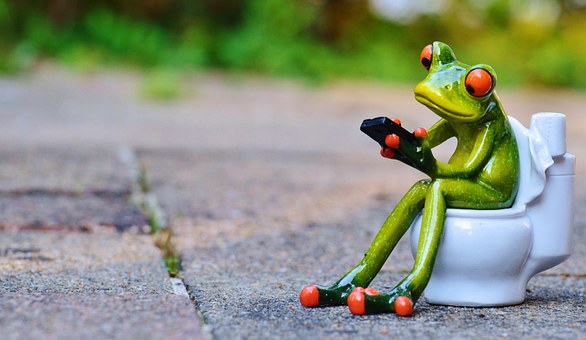 IBS with constipation is thought to be less problematic than IBS with diarrhea. In some ways, this may be the case. With constipation, we (yes, I am in this group) seldom have an emergency dash to the toilet or accidents in public. However, while IBS with diarrhea can be rapidly solved with an accurate low Fodmap diet and good controls on fibre and fat levels in the diet, solving constipation is a little more difficult. Below are nine steps I personally take and advise my clients to take in order to create regular toilet habits with easy-to-pass bowel movements.
IBS with constipation is thought to be less problematic than IBS with diarrhea. In some ways, this may be the case. With constipation, we (yes, I am in this group) seldom have an emergency dash to the toilet or accidents in public. However, while IBS with diarrhea can be rapidly solved with an accurate low Fodmap diet and good controls on fibre and fat levels in the diet, solving constipation is a little more difficult. Below are nine steps I personally take and advise my clients to take in order to create regular toilet habits with easy-to-pass bowel movements.
- Drink eight glasses of water a day in small constant sips rather than in larger amounts all at once. Have a little extra if you exercise for prolonged periods of time or live in a hot climate.
- Eat breakfast within 30 minutes of getting up (no excuses about exercising first) and always include ¼ cup oats (raw measurement) and 1 tbsp chia seeds (soaked in water or lactose-free milk for at least 30 minutes) or 1 tbsp flaxseeds. This will increase your fibre intake to help form good bowel movements.
- Preferably, go to the toilet after breakfast rather than before. Obviously, if you have a strong urge to go before, don’t ignore it. But, if you have had nothing to eat since three hours before bedtime the night before, there should not be an urge.
- If the oats and chia seeds are not enough fibre for you (ideal fibre levels are individual), then have around half a cup of cooked quinoa at lunch or dinner. Use quinoa as a tool when you feel yourself getting a little more constipated.
- Have 5-6 helpings of low Fodmap vegetables a day.
- Four prunes are high Fodmap with sorbitol and fructans, but try one a few times a day to keep under the trigger level. They will help soften your stools. In fact, foods containing sorbitol and/or mannitol, draw liquid into the gut so can be used carefully as a tool to help with constipation.
- Exercise daily for at least 30 minutes to get your heart rate up and move the large muscles of your body. This will reduce cramping and encourage good gut health.
- Check the side effects of all medications and supplements to see if they could be worsening your constipation – calcium, iron and certain anti-depressants in particular. Check with your doctor for advice.
- If none of the above helps despite consistently following this advice, try magnesium citrate. Start with 100mg a day and build from there if necessary. Don’t start at the recommended dose on the bottle – that will be too much initially. Check first with your doctor to see if this is safe for you to take.
- If you do find yourself getting backed up and think you may have impacted stools, then try a stool softener like Molaxole, starting with just a couple of sachets. But, get medical advice first.




Hello Suzanne,
So wonderful to hear from you again! Hope you and your family are well and thriving in these challenging times.
This is exactly what I needed, timed perfectly as dealing with setbacks due to severe fall at end of June and my body and injuries being treated for shock. My Fodmap loyalty remains strong and ongoing.
Warmest regards
Helene
We are all well and thriving. I took some time out from blogging to focus on my coaching business, but recently I felt the urge to communicate with my followers again. I am so sorry to hear about your fall and wish you all the best for a speedy recovery.
Hi Suzanne! So nice to hear from you! 🙂 I am so pleased that everyone is so well. Thank you so much for this article.
I had knee replacement surgery on June 28th and with all of the pain meds, the constipation has been worse and I am having to take more stool softeners. But, I am cutting down the pain meds; so that’s nice.
What about prune juice? I suppose it would be a tiny amount?
Blessings to you!
Sorry to hear about the increased constipation following surgery. Those kinds of meds are often an issue for us. It would be better to have the actual prunes themselves so you get the fibre, which you wouldn’t get from the juice. Let me know how you go with using all the tips in the article.
Dear Suzanne,
It was very timely to hear from you and glad to hear that you and your family have got through this strange time.
Since doing the low FODMAP diet for nearly 3years now which has helped in measure I have been diagnosed with SIBO which explains a lot.
So much of what you recommend for constipation is making an improvement and the magnesium (I take 100 grams after breakfast and the same after supper ) and also prunes seem to help too.
I’ve been eating the same breakfast every day although never soaked the chia seeds. That’s helpful to know.
Do you have any useful tips for SIBO sufferes?
Best wishes.
Sarah de Silva
How were you diagnosed with SIBO? Unfortunately, the hydrogen breath test has been found to be inaccurate and gives many false positives and negatives. Perhaps read this article: https://www.monashfodmap.com/blog/whats-go-with-sibo/
When you have SIBO, you need to have a course of antibiotics to correct it, but you need to stay on the low Fodmap diet to prevent a recurrence because it can come back again and again. However, the diet alone will not eliminate SIBO.
Hello, I hope low fodmap helps. I have dealt with this challenge my whole life. My early years were always back and forth. Now in my 60’s, as with everything else, my body is really struggling to get out of this rut. Netflix has a great documentary about the gut and explains a lot. Right now it’s kinda wait and see. I am working with my gastro doctor. One question, I read something about the Vegas nerve. I have an unusual coincidence of sneezing and runny nose when my gut is out of sorts. I’ll sneeze just all of a sudden, usually twice…or more. My nose runs..like a faucet with a bad washer. Then it stops. Sometimes significantly drying up. I never quite sure when it will happen. Is there a relationship between IBSC, the Vegas nerve, and the possibility it may trigger sneezing? I’ve been to an allergist, but not helpful. What are your thoughts. Does anyone else see a relationship?
Linda
There does seem to be a connection between IBS and the Vagus nerve. https://www.sciencedirect.com/science/article/abs/pii/S0306452223003858 Not so sure about the runny nose and IBS, but it’s always possible.
Thank you for sharing this informative post! I’ve been struggling with IBS-C for a while now, and the step-by-step approach to the Low FODMAP diet is really helpful. I can’t wait to try out your suggestions and hopefully find some relief. Any tips on easy meal prep ideas would be greatly appreciated!